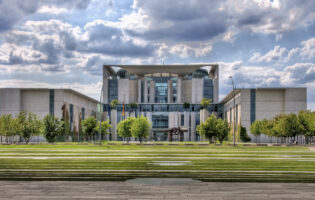The Danger of Another Grand Coalition: German Democracy and the Dahrendorf Thesis

Stephen F. Szabo
Senior Fellow
Dr. Stephen F. Szabo is a Senior Fellow at AICGS, where he focuses on German foreign and security policies and the new German role in Europe and beyond. Until 2017, he was the Executive Director of the Transatlantic Academy, a Washington, DC, based forum for research and dialogue between scholars, policy experts, and authors from both sides of the Atlantic. Prior to joining the German Marshall Fund in 2007, Dr. Szabo was Interim Dean and Associate Dean for Academic Affairs and taught European Studies at The Paul H. Nitze School of Advanced International Studies, Johns Hopkins University. He served as Professor of National Security Affairs at the National War College, National Defense University (1982-1990). He received his PhD in Political Science from Georgetown University and has been a fellow with the Alexander von Humboldt Stiftung, the Woodrow Wilson International Center for Scholars, and the American Academy in Berlin, as well as serving as Research Director at AICGS. In addition to SAIS, he has taught at the Hertie School of Governance, Georgetown University, George Washington University, and the University of Virginia. He has published widely on European and German politics and foreign policies, including. The Successor Generation: International Perspectives of Postwar Europeans, The Diplomacy of German Unification, Parting Ways: The Crisis in the German-American Relationship, and Germany, Russia and the Rise of Geo-Economics.
As the German political parties begin negotiations that could lead to yet another Grand Coalition, they should reread one of the best books written on contemporary German political culture, Ralf Dahrendorf’s Society and Democracy in Germany (New York: Doubleday Anchor, 1967). Although published in 1965 in West Germany, it captures the essence of Germany’s long struggle with democracy and the West and remains relevant to understanding the current political situation in now a reunified Germany. Dahrendorf, a sociologist, liberal, and long-time member of the Free Democrats and Anglophile par excellence (he was the Governor of the London School of Economics for a decade, a Warden at Oxford, and was granted a life peerage), posed the German question as follows: “Why have so few in Germany embraced the principle of liberal democracy?” His answer was that liberty requires conflict and the recognition that conflict is a moving force of social development and is the inevitable consequence of the diversity of society and of the nature of reality. “Conflict is liberty, because by conflict alone the multitude and incompatibility of human interests and desires find adequate expression in a world of notorious uncertainty.” Dahrendorf argued that “liberal democracy can work only in the context of a society whose institutions are characterized throughout by the recognition and rational canalization of conflicts.” He saw in the German desire for consensus and the belief in apolitical expertise a cultural avoidance of conflict and therefore of politics. Gemeinschaft, an organic community, rather than Gesellschaft, society based on clashing interests, has been a persistent theme in German politics.
While Germany has developed into a stable parliamentary democracy which is the envy of the world and is seen by many outside the country as the best hope for the western liberal order, there are clear signs that it has not overcome this aversion to conflict and remains a very imperfect liberal democracy in Dahrendorf’s sense of the term. The longing for grand coalitions that has resurfaced in the wake of the collapse of the Jamaica coalition talks and the legacy of the Merkel era all indicate that German desire for an apolitical politics continues. However, the rise of a now seven-party system and the decline of the Volksparteien are also indicators that this culture is now coming to an end.
It is therefore important that the negotiations for a third so-called Grand Coalition in the past twelve years fail and that Germans come to terms with the need for open contestation in the parliament. A minority government will be a messy affair but it will energize German politics and revitalize the parliamentary system. One of the legacies of the stability of the consensus years has been a growing sense in the public that the system is beyond their control and does not respond to their concerns. This has been especially the case with the coalition’s handling of the refugee crisis. Berlin may not be the Washington swamp but it has become a more efficient German version nonetheless.
Dahrendorf concluded his analysis by arguing against a grand coalition. He wrote in the mid 1960s, “the echo of the authoritarian aversion to social conflict may still be heard. In politics there are many who desire a grand coalition to put an end to party strife.” He went on to warn about the German desire for “the one man or the few who know the right answer to all questions.” The grand coalition he feared followed and produced the rise of the APO, the Anti Parliamentary Opposition of the late 1960s, and the terrorism which followed in the 1970s. Today, a third grand coalition and twelve years of Merkel’s rule have produced the AfD, the Linke, and the end of the Volksparteien. Merkelism’s consensus-oriented reign has depoliticized German politics, avoided reforms, and created a Weimar style multiparty system with an empty center. Germans only need to look next door to Austria to see where this über consensus politics can lead. The German public’s desire for a continuation of Merkel as chancellor despite all these consequences reflects Dahrendorf’s fear that Germans looked to the right man, in this case woman, to save them from conflict. The return of eastern Germany has brought with it a longing for a lost sense of Gemeinschaft and a return of a Völkisch sense of identity to unified Germany, along with a legacy of looking for authoritarian leaders. Germans are not alone in this search, and much worse examples of strong men have emerged in the United States, Russia, Turkey, China, and elsewhere. Angela Merkel is not this kind of problem, and American style polarization is not the alternative, but she reflects the continuing relevance of Dahrendorf’s German question.









